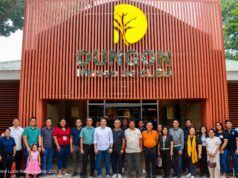NATIONAL HEROES Day, on the fourth Monday of August, is dedicated to men and women, known or unknown, who sacrifi ced their lives for Philippine freedom.
A national holiday, the day has become – rather than an event to remember our heroes – one more delightful excuse for malling, vacationing, and just loafing. Sheer serendipity then for me to fi nd this piece – while clearing my boxes of clippings and newspaper fIles – published under my by-line in The Voice, February 20-26. 2000 issue.
“THE PATRIOTISM and statesmanship of the Pampanga hero must be properly commemorated and remembered to serve as an eternal light to guide and inspire us in the proper fulfilment of our love and obligation to our country and people.”
Thus declared President Estrada in Proclamation 229 designating February 19 as Chief Justice Jose Abad Santos Day. In my long-gone days of youth, Abad Santos shared equal space with Andres Bonifacio, Jose Rizal and Macario Sacay in our pantheon of heroes.
Those endless school plays of the last hours of Abad Santos highlighted by his admonition to his son Pepito to “show these people that you are brave…that not everyone is given the opportunity to die for his country” fixated in my thought processes the parallel lives of Bonifacio-Rizal, Sacay and Abad Santos.
Martyrs all at the major epochs of our history as a people: the Spanish Colonization for the first, the American Period for the second, the Japanese Occupation for the third. Joined in later by Ninoy Aquino during the home-grown dictatorship.
In my teens, at the onset of my conscientization of socio-economic and political issues, Jose Abad Santos was relegated to lesser lights in my own hierarchy of heroes, in favour of another Abad Santos, his sibling Don Pedro.
Born to the landed gentry, Don Pedro became a traitor to his class when he embraced socialism and devoted his whole life to the propagation of the cause. I saw in Don Pedro a conversion akin to that of Francis of Assisi, albeit on the social plane. The son of a rich merchant named Pietro di Bernardone, the monk called Brother Sun renounced his father’s wealth and turned to a lifetime of prayer and devoted service to the poor.
Through the years, my list of heroes grew longer: Mahatma Gandhi, Martin Luther King, and Angelo Roncalli, also known as Pope John XXIII; Karl Marx, V.I. Lenin, Ho Chi Minh and Mao Zedong; Che Guevara, all alone; Yassir Arafat as well as David Ben-Gurion; Emiliano Zapata, whom I tend to believe was my great, great grandpa; Chino Roces and Lorenzo Tanada.
Varied as they are, there is a common ground for my heroes, for all heroes, for that matter. The essence of heroism draws from both the Messianic and Mosaic elements found manifest among revolutionaries and liberators, as well as among those who set the order of things through laws, norms or standards of human conduct.
The sum of a hero’s life impacts on the times and the world beyond his own. Thus, the collective epitaph for heroes:
“He left this world a better place than when he came in.” (Better yet on hindsight now: “Now, he belongs to the ages,” as said of Abraham Lincoln by his Secretary of War Edwin Stanton. As indeed, heroes belong to all ages.)
Comes to the mind the question: Are heroes born or made? Better phrased yet: Do heroes create circumstances, or do circumstances create heroes? I believe the answer comes from this quote which origin I have already forgotten.
I am not so sure now if it came from Arnold Toynbee’s monumental opus A Study of History. It goes thus: “When he has in him to give, and the situation demands of him to give, he has no other recourse but to give.”
Bonifacio-Rizal. Sacay. Abad Santos. They all had in them to give. Placed in the situation, they gave it all. So we remember them. Bonifacio-Rizal with shrines, countless monuments, educational institutions, even a match brand and a bank for the latter, movies and books, streets, barrios, towns, even a province, again for the latter.
About Sacay? One recent movie. About Abad Santos? A few schools and streets. Oh yes, I remember. The Abad Santos ancestral home in San Fernando designated as a shrine by the National Historical Institute had long been torn down. Its NHI marker perhaps sold to the nearest junk shop. What sacrilege!
If that is our way of remembering our heroes, then, indeed, we are a nation accursed. Is it not said – and said so truthfully – that a nation that does not honor its heroes is doomed? The sceptical philosopher George Santayana wrote in The Life of Reason” “Those who cannot remember the past are condemned to repeat it.”
What future lies for us if we have opted not only to forget but even disgrace our heroic past?




